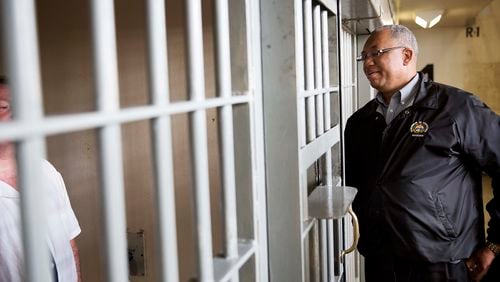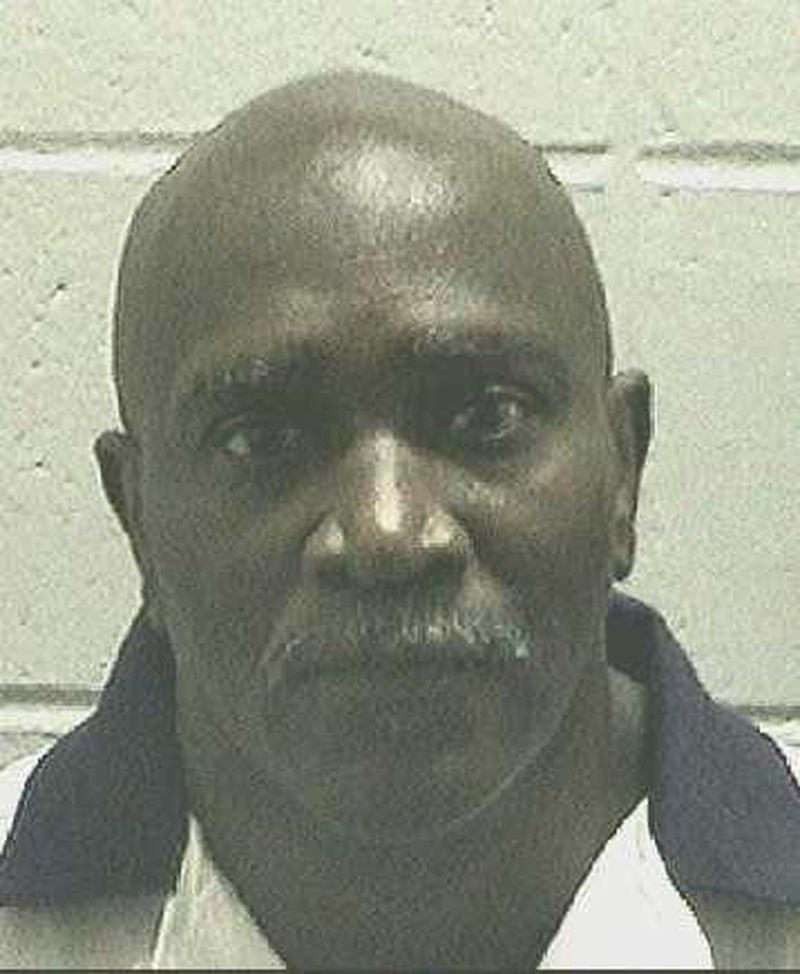Attorneys for condemned killer Keith Tharpe are trying to halt his Sept. 26 execution with arguments that a juror on the case was racist and voted for death because Tharpe was African-American.
The now-deceased juror, Barney Gattie, once said, “After studying the Bible, I have wondered if black people even have souls,” court filings say.
Gattie later backed off his statements, and Tharpe’s juror bias claims have gone nowhere. They previously were rejected by state court judges and, just a week ago, a federal judge in Macon denied a motion to reopen the case.
Tharpe’s legal team is now appealing that decision to the 11th U.S. Circuit Court of Appeals in Atlanta.
Tharpe sits on death row for committing particularly heinous crimes after his wife left him and moved in with her parents. On the morning of Sept. 25, 1990, instead of obeying a court order to stay away from his wife, Tharpe intercepted her and her sister-in-law as they drove to work in Jones County.
Tharpe forced the car to stop, pulled out a shotgun and took his sister-in-law, Jacqueline Freeman, to the rear of the car. He shot her, rolled her into a ditch, reloaded and shot her again, killing her.
Tharpe then raped his wife on the side of the road and drove her to Macon, telling her to take money out of her credit union account. Instead, she called police and Tharpe was soon arrested.
His capital trial was held about 100 days later, a short amount of time unheard of today. The jury unanimously sentenced Tharpe to death.
Claims of alleged racial bias of one of the jurors surfaced eight years later when Gattie, a retired truck driver with eight children, signed an affidavit that expressed his views.
In the affidavit, Gattie described himself as “an upfront, plainspoken man,” and he said his wife had warned him about using racial slurs when talking to African-Americans.
Freeman, the murder victim, came from a family of “nice black folks,” Gattie said. “If they had been the type Tharpe is, then picking between life and death for Tharpe wouldn’t have mattered so much. My feeling is, what would be the difference?”
Gattie said he felt Tharpe, “who wasn’t in the ‘good’ black folks category in my book, should get the electric chair for what he did.” (Georgia has changed its method of execution to lethal injection since Tharpe’s 1990 trial.)
Gattie also said, “In my experience, there are two types of black people: 1. Black folks and 2. (racial slurs),” he said.
Gattie’s statements were included in an affidavit he signed May 25, 1998, and which was prepared by Tharpe’s lawyers after they interviewed him. The affidavit immediately caught the attention of the state Attorney General’s Office.
Just two days later, Gattie signed a second affidavit, one prepared by a lawyer for the state. It largely contradicted his prior affidavit.
“I believe Keith Tharpe was a cold, calculated murderer,” Gattie said. “I did not vote to impose the death penalty because he was a black man.”
At no time, Gattie said, did he utter a racial slur during jury deliberations. As for signing the March 25, 1998, affidavit, Gattie said he’d been drinking beer and whiskey and didn’t pay much attention when it was read to him.
“I just wanted to get rid of them,” Gattie said of Tharpe’s lawyers. “Many of my statements were taken out of context and simply not accurate.”
Five months later, Gattie gave sworn testimony before a state court judge, answering questions from lawyers for the state and the defense. Gattie admitted he used racial slurs, but not in a bigoted context.
“It was used in the terms that you are a white (racial slur) or a black (racial slur),” he said. “If you commit a crime or you do wrong and you don’t work and you don’t do that, that is the term I have used it in.”
Gattie insisted, “I am not against blacks.”
Tharpe’s lawyers filed new motions after the U.S. Supreme Court ruled in March that courts can examine what happened in a jury room when there are showings that racial prejudice played a role in deliberations.
But Senior U.S. District Judge Ashley Royal in Macon recently rejected the claims. Royal noted that 10 other jurors in the Tharpe case testified and that all said racial animus played no part in their deliberations.
In March, the U.S. Supreme Court said a case can be reopened only when “a juror makes a clear statement that he … relied on racial stereotypes or animus to convict a criminal defendant.”
But in Tharpe’s case, “There is absolutely no indication that Gattie, or anyone else, brought up race during the jury deliberations,” Royal wrote. “It was more than seven years later, and possibly when he was intoxicated, that Gattie made his racist statements.”
Tharpe’s lawyers are now asking the 11th Circuit to consider the juror misconduct claim.
“(A) grotesque perversion of justice … results when a death sentence, such as Mr. Tharpe’s, is imposed as a result of a juror’s racially biased views,” their motion said.
RELATED
About the Author








